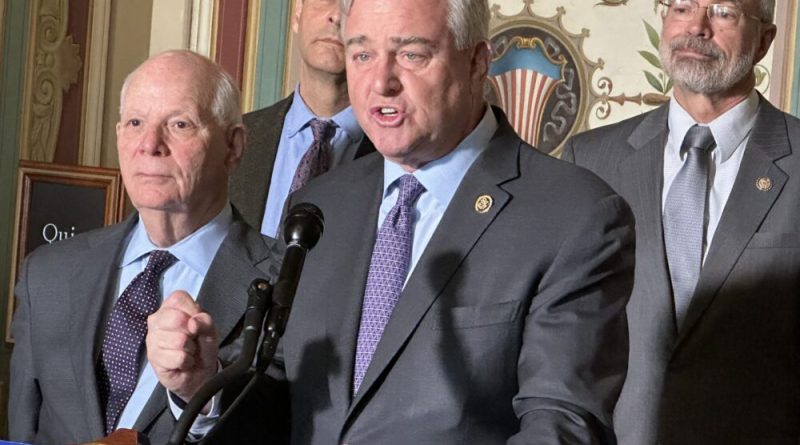Democratic Senate hopeful Trone sees himself as progressive conciliator
Editor’s note: Capital News Service also is publishing a profile on Democratic Senate candidate Angela Alsobrooks.
By KATHARINE WILSON
WASHINGTON – Rep. David Trone views himself as an outsider in Congress. On May 14, Maryland voters will decide if the three-term lawmaker, self-described progressive and wealthy businessman is the right Democrat to try to retain a Senate seat for the party.
Trone doesn’t play golf or hold a membership to any country club, he said, but that doesn’t stop his Democratic opponents in the primary from criticizing him for being out of touch with Marylanders, PACs from calling him a “billionaire bully,” and some fellow politicians from seeing him as not a real progressive.
However, Trone sees this image as almost an advantage in his efforts to reach across the aisle to Republicans.
“You’re stereotyped because you’re a white businessman so therefore you can’t be progressive, but I’m far and away the progressive in this race,” Trone said in an interview with Capital News Service. “But I’m the progressive that gets stuff done … I reach across the aisle and figure out how to bring parties together.”
Trone is running against Prince George’s County Executive Angela Alsobrooks and eight lesser-known Democrats in the primary. Trone and Alsobrooks by far dominate the field in spending, polls and ads.
Former Gov. Larry Hogan is the presumed Republican nominee for the Senate.
Trone has represented Maryland’s 6th District, which includes Western Maryland and parts of Montgomery County, since 2019.
In an April 9 interview with CNS at the Democratic National Committee, Trone discussed his life, House career and what he hopes for the future.
As he spoke, he effortlessly rattled off various statistics and facts about his record before running off for House votes.
Born in Cheverly, Maryland in 1955, the congressman spent his teenage years working at his family farm near the Pennsylvania-Maryland border. After finishing his undergraduate degree at Furman University, Trone moved back to the farm, living with his father and brother.
Life wasn’t easy for the family. His father was an abusive alcoholic, Trone said, and they lost the family farm when the future lawmaker was in his mid-twenties.
As Trone put himself through an M.B.A. program on a scholarship at the University of Pennsylvania’s Wharton Business School, he opened his first business brokering eggs and later his first beer and soda store.
Trone eventually built an empire with Total Wine & More, his billion-dollar liquor chain that has grown to at least 266 locations across 28 states.
“I understand the value of work better than anybody in this race, it’s not even close,” Trone said.
Making his fortune off of Total Wine & More gave Trone the opportunity to run for office his own way, running without relying on PAC and special interest funding.
Trone won his first election in the 6th District in 2018 after he lost his first House race two years earlier in a primary against Rep. Jamie Raskin in the 8th District.
Trone has spent $41 million of his own money on his Senate campaign, according to the most recent Federal Election Commission reports. Outside of his own funding, Trone received $105,000 from the American Israel Public Affairs Committee. The committee has not given him any funding since June 2023.
Trone is a long-term supporter of Israel and has advocated for a two-state solution and a ceasefire in Gaza, positions he reiterated in an April 19 Senate debate.
While Trone acknowledged that not everyone can self-fund a Senate campaign, he said that this allows him to be truly independent and fight against the pharmaceutical industry and other major corporations.
“I’m one of the few people that can do that,” Trone said about self-funding. “I’m willing to put my resources that I earned from zero and rather than giving them to my kids, I’m putting it into a campaign to change America the much better way.”
Rep. Dutch Ruppersberger, D-Maryland, works with Trone on the House Appropriations Committee and endorsed the candidate in November. Ruppersberger said he respects Trone for being a self-made person and being a hard worker on committees.
“He still cares about helping his country and he doesn’t need to do this for money or anything else,” Ruppersberger said in an interview outside of the House chamber. “He just cares about being a U.S. congressman.”
Maryland Attorney General Anthony Brown praised Trone in an ad for the campaign.
“He will level the playing field because he believes that everyone deserves an equal shot and he will always be there on the frontline of justice,” Brown said.
Alsobrooks, his opponent, has made headlines for her endorsements from other Maryland Democratic politicians including Gov. Wes Moore, Sen. Chris Van Hollen and five of Trone’s colleagues in the House.
Trone said part of the reason why he didn’t receive those endorsements is because of congressional reforms he has proposed. They include instituting term limits, taking away special interest money in campaigns, eliminating stock trading by lawmakers and banning senators and House members from becoming lobbyists.
“The politicians, they’re a part of the club…I’m an outsider,” Trone said. “They’re all politicians who pat each other on the back…I don’t do any of this stuff.”
Trone said he decided to enter the Senate race after Sen. Ben Cardin, D–Maryland, announced his retirement, presenting an opportunity to step up and be effective statewide.
Trone also said in a Feb. 29 speech at the University of Maryland that he wanted to switch to the Senate because senators got more done than the closely-divided House.
Trone’s policy priorities are in mental health care, addiction, education, criminal justice reform and medical research.
Many of these issues are personal to Trone, who is a cancer survivor, a public school system graduate and the uncle of a victim of a fatal fentanyl overdose.
In the last Congress, Trone said, he helped to pass 26 bills on substance abuse and mental health.
He funded the American Civil Liberties Union’s Trone Center for Criminal Justice in 2015. Trone became passionate about criminal justice reform after being wrongfully accused of various business violations by a Pennsylvania attorney general during his time in business school, according to the ACLU.
“Justice was unfair to me,” Trone said. “I came out and …was able to be hugely successful. Others that are Black and Brown don’t get that shot and that makes me madder than a hornet.”
Trone’s campaign has not been without controversy.
He often touts his perfect record on voting for abortion protections and abiding by all Planned Parenthood requests to testify or write a letter in support of abortion access. Trone was also a supporter of an abortion clinic that opened last year in Cumberland, Maryland, across from West Virginia, which has strict abortion laws.
However, Alsobrooks and other Trone opponents cite a Time magazine report last year that Trone’s firm Retail Services and Systems donated to pro-life Republican candidates, including Texas Gov. Greg Abbott.
Trone stepped down from day-to-day operations of his businesses around 2015, he said, and funding GOP candidates was in an effort to protect his employees’ jobs. For example, he was pushing for relaxing liquor laws in Colorado in 2022.
Trone said that in federal races, he has donated only to Democrats.
“It was my job to protect the jobs of my folks’ thousands of jobs in…those states that don’t share our values in many, many ways,” Trone said.
During a House budget hearing in March, Trone mistakenly uttered a racial slur while talking about tax rates, drawing staunch criticism online. He apologized, saying that the word should never be “used any time, anywhere, in any conversation”.
Trone also has been labeled as a “billionaire bully” by Fight Corporate Monopolies, a progressive PAC, that ran an ad this month criticizing Trone’s actions as a businessman, including a disputed claim about threatening a delivery worker in 2021 and emphasizing that the Federal Trade Commission sued Total Wine & More last year in a monopoly investigation.
Trone’s campaign has denied the threat allegation, saying Trone “never made the statement this organization is alleging.” The FTC settled with Total Wine & More in December.
Trone claimed that he is the only one in this race who could beat Hogan in the general election, a race which could help determine control of the Senate.
Trone has won in Republican areas of Western Maryland and he can therefore appeal to voters across the state, the congressman said.
Trone also cited various recent polls that show his strength against the former governor. In nearly every poll since Hogan launched his Senate bid, Trone is the most competitive candidate against the former governor, who nevertheless is favored against both Democratic candidates.
What sets him apart from Alsobrooks in this race, Trone said, are his connections in the Senate, his ability to prevail over adversity and his rejection of special interest funding in his campaign.
“I’m ready for the job day one,” Trone said. “I’ve created a $6 billion business from zero and started with nothing. Nothing has ever been given to me.”

Capital News Service is a student-powered news organization run by the University of Maryland Philip Merrill College of Journalism. With bureaus in Annapolis and Washington run by professional journalists with decades of experience, they deliver news in multiple formats via partner news organizations and a destination Website.

